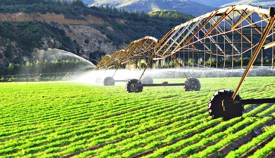 Simply put, farmers are the true stewards of the nation’s water supply.
Simply put, farmers are the true stewards of the nation’s water supply.
Agribusiness places some of the greatest demands on fresh water in the U.S. and around the world. According to the latest statistics provided by the United States Geological Survey, farmers use 138.92 billion gallons of water a day for irrigation, livestock care and aquaculture.
The importance of farmers’ role in using the world’s most vital natural resource as responsibly as possible cannot be overstated. As the population grows and more food is required, better water management will become as critical as the water itself.
Below, we take a look at five helpful water conservation resources for farmers.
1. More Efficient Irrigation Equipment
Irrigation equipment upgrades can be costly, but there is no question that it will be worth it in the long run. The reality of an ever-shrinking water supply in the face of growing needs will become more evident, and eventually the true cost of water will emerge.
The most efficient irrigation system will depend on the type of crop, the type of soil, area climate and other factors. Gravity-flow systems and irrigation systems are just two examples of possible solutions for more efficient water use. Using water flow meters can help measure and control the amount of water being used in irrigation.
2. Weather Apps
Some farmers may be inclined to set an automated irrigation schedule and let it run regardless of the weather. Adjusting irrigation systems to work in better harmony with natural precipitation takes more work, but it is an inarguable way to save significant amounts of water.
There are numerous weather apps available that provide up-to-the-second precipitation reports. Using these along with irrigation systems can help save water, which will save farmers money and reduce wear and tear on systems.
3. Soil Management
Proper soil management is a key to conserving water. It is the soil that absorbs, transmits and holds the water for crops to use and there is much a farmer can do to manipulate the nature of soil, and is especially helpful if the soil quality is compromised.
Various techniques farmers may consider include conservation tillage, using compost and utilizing cover for crops. Again, what works the best to conserve water will depend on what kind of soil is being managed.
4. Water Recycling
Avoiding or mitigating runoff can save millions of gallons of water over the course of a growing season. Runoff can occur due to overwatering, poor soil and other factors, and in any case is a natural result of irrigation to some degree.
Recycling runoff not only helps save water, it helps save entire ecosystems. Agricultural runoff typically contains large amounts of chemicals that can seep into groundwater and pollute rivers, streams and other bodies of water. The costs are significant, but so are the benefits.
5. Organic Farming Methods
Water recycling is far less expensive when a farmer doesn’t have to treat the water before reusing it. Organic farming methods that reduce or eliminate the use of chemicals are yet another way for farmers to conserve water by taking out a costly step in the recycling process.
Using organic farming methods can arguably also lower the water-use footprint by preserving the quality of water that would otherwise be negatively affected by polluted runoff. That said, not all organic farming methods reduce the amount of water used, so conservation-minded farmers should carefully consider the options.
Do you have additional suggestions for farming water conservation tools? Please share them in the comments below.
Stock Photo by Shutterstock
